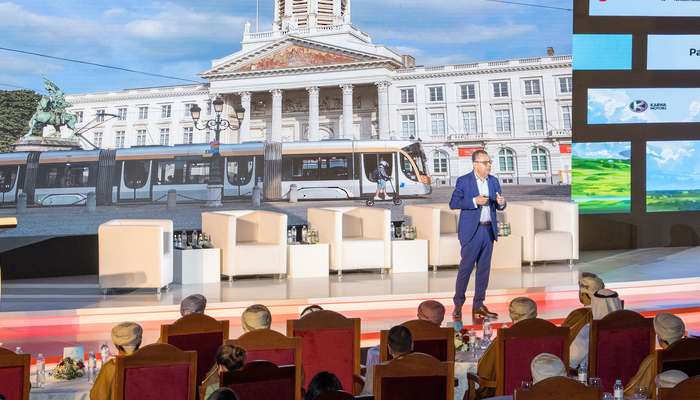
Muscat : Mwasalat launched the first electric bus in the Sultanate of Oman under the slogan ‘Smart Transportation in Sustainable Cities,” in Salalah on Tuesday.
This conference was hosted on Tuesday by the Omani National Transport Company “Mwasalat”, one of the Asyad Group companies, at the Sultan Qaboos Youth Complex for Culture and Entertainment in Salalah under the patronage of His Highness Sayyid Marwan bin Turki Al Said, Governor of Dhofar, in the presence of Engineer Saeed bin Hamoud Al Maawali, Minister of Transport and Communications and Information Technology, and a number of their excellencies, and members of the executive management of the International Union of Public Transport.
On the sidelines of the conference, Mwasalat launched the first electric bus in in a pioneering step towards enhancing the sustainability of the public transportation system, and an affirmation of Mwasalat’s commitment to achieving sustainability in its operations and seeking to enhance environmental care in accordance with the sustainability strategy developed by the Asyad Group and in support for efforts to achieve the national goal of reaching net zero emissions by 2050.
Engineer Badr bin Mohammed Al Nadabi, CEO of Mwasalat , said that the bus has a capacity of 28 passengers, and is electronically adjusted to travel at a speed of 70 to 130 kilometres per hour, making it suitable for use within cities. He said that the bus is 8.94 metres long, 2.42 metres wide and 3.3 metres high.
Al Nadabi added that the bus features an advanced propulsion system that includes a permanent magnet synchronous motor and a lithium iron phosphate battery with a capacity of 211.43 kWh, which ensures high efficiency in performance and sustainability. The battery complies with the standards of the United Nations Economic Commission in Europe, ensuring a high level of safety and quality within international specifications.
The conference included four main sessions, the first of which dealt with “enhancing urban sustainability through public transportation in the Middle East and North Africa region,” and focused on the pivotal role of public transportation in achieving environmental sustainability, reducing traffic congestion, and lowering pollution levels, which contributes to building green cities and healthy urban environments.
While the second session focused on “Green Technologies and Pioneering Sustainable Public Transport in the Region,” reviewing the latest innovations in the sector, including electric buses and hydrogen fuel cells, in which Mwasalat had pioneering experience.
The third session reviewed “Intelligent Transportation Systems and the major transformations that public transportation networks are witnessing, thanks to smart systems,” and the role of these systems in improving operational efficiency and passenger experience.
While the fourth session dealt with “strengthening the public transport structure and integration in the region, in line with global best practices and the latest policies adopted in the sector.”
During the conference, Mwasalat signed a cooperation programme with the American company Odis, with the aim of developing sustainable self-driving air transport technology.
The agreement includes many vital axes, including joint research and development, the exchange of technical knowledge, in addition to developing innovative solutions for drones to serve the sectors of transportation, oil and gas, security, tourism, and health services.
A cooperation programme was also signed with HICAP Middle East to prepare a quality study to remove carbon from the joint transportation fleet in the Sultanate of Oman, determine the cost and infrastructure necessary for it, and develop strategies in line with Mawasalat’s commitment to sustainability and its study of green fuel options and hydrogen in particular.
The conference aimed to enhance sustainability at the national and international levels, by opening opportunities to exchange experiences and cooperate to develop sustainable and innovative transportation solutions that help improve the quality of life in the region, in conjunction with Mwasalat taking executive steps to reduce the carbon footprint of its operations, and transforming sustainability plans into tangible actions on the ground.
The 2024 World Transport and Public Transport Union Conference in the Middle East and North Africa discussed ways to benefit from modern technologies and smart systems in the sector and adopt advanced transportation policies, in addition to reviewing visions and experiences on sustainability, green technologies, and electric buses, with the participation of a number of international specialists in the transportation sector.
--